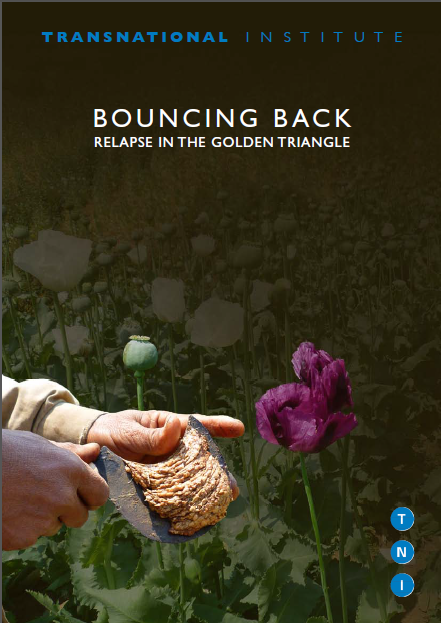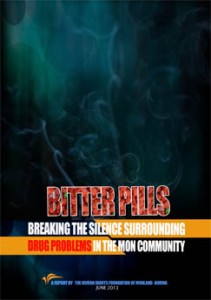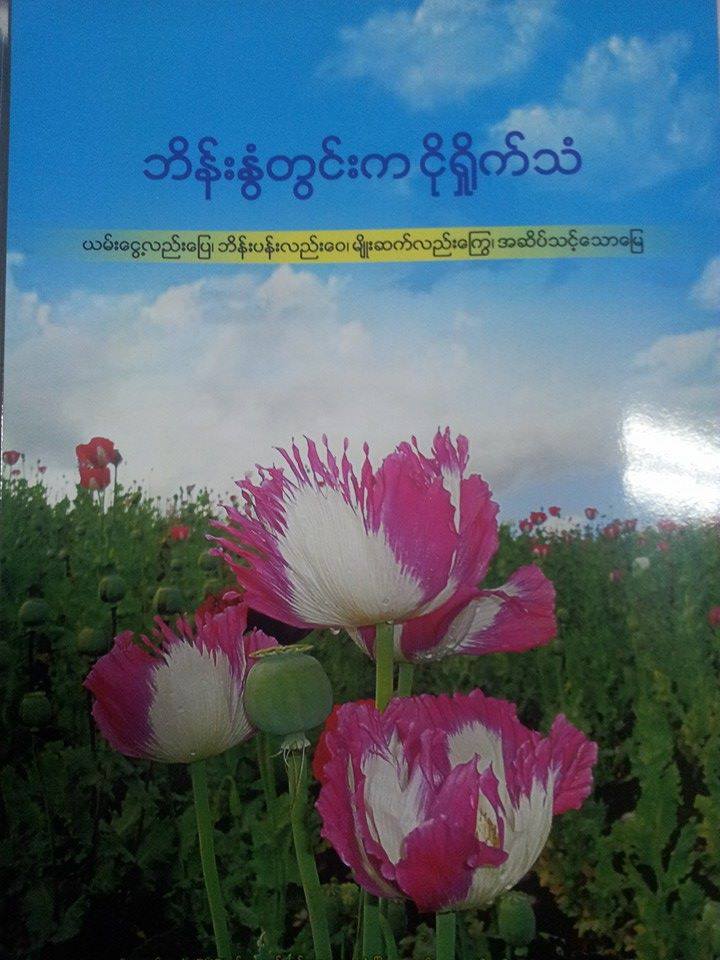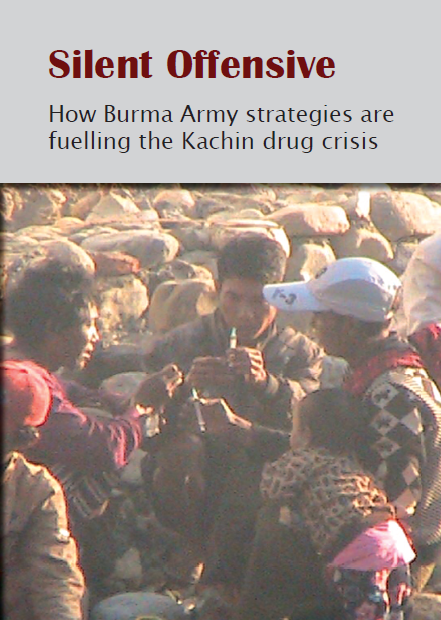Drugs (35 found)
Southeast Asia Opium Survey 2014 – Lao PDR, Myanmar
The roots of the opium production problem in Southeast Asia go back to the 19th century. The region is home to the “Golden Triangle”, an area long associated with opium and heroin production, located where the borders of Myanmar, Lao People’s Democratic Republic (Lao PDR) and Thailand converge along the Mekong River. Twenty years ago, the Golden Triangle was the largest heroin‐producing area in the world, supplying the region’s own demand as well as exporting its surplus to North‐east Asia, Europe and the United States of America. In the 1990s and early 2000s, national and regional efforts succeeded in reducing both opium production and trade in the region, though they subsequently increased.
• • •“ဘိန္းႏြံတြင္းက ငိုရႈိက္သံ” အစီရင္ခံစာ
၁၈၈၆ တြင္ အထက္ျမန္မာျပည္ကို အဂၤလိပ္တို႔ သိမ္းပိုက္ၿပီးေနာက္ တရုတ္-ျမန္မာနယ္စပ္ တေလ်ာက္တြင္ အေရွ႕ေတာင္အာရွ၌ ဘိန္းစိုက္ပ်ဳိးထုတ္လုပ္မႈ စတင္ ထြန္းကား ရာေဒသ ျဖစ္လာခဲ့ သည္။ ျမန္မာႏိုင္ငံသည္ ၁၉၄၈ ခုႏွစ္တြင္ အဂၤလိပ္တို႔ ထံမွ လြတ္လပ္ေရး ရရွိခဲ့ေသာ္လည္း ရွမ္းျပည္နယ္မွ ဘိန္းစိုက္ပ်ဳိး ထုတ္လုပ္ မႈသည္ အနာဂတ္တြင္ ျပႆနာမ်ားျဖစ္ထြန္းမႈ ပိုမိုႀကီးထြား လာေစသည့္ မ်ဳိးေစ့မ်ားကို ခ်ထားၿပီး ျဖစ္ေနသည္။ […]
• • •Silent Offensive: How Burma Army Strategies are Fuelling the Kachin Drug Crisis
This report, based on interviews with Kachin drug users, their family members, drug sellers, and community leaders in eight townships of northern Burma, paints a disturbing picture of the drug crisis in Kachin areas. It shows how the renewed conflict against the Kachin Independence Army (KIA) since June 2011 is fuelling drug production and worsening existing drug abuse among Kachin communities. […]
• • •Opium Cultivation Bounces Back: TNI Report Shows Dramatic Failure of ASEAN’s ‘Drug Free’ Strategy
 Bouncing Back – Relapse in the Golden Triangle, a new in-depth report by the Transnational Institute (TNI) launched in Yangon, Burma/Myanmar, on Monday June 2, highlights the profound changes in the illicit drugs market in the Golden Triangle – Burma, Thailand and Laos – and neighbouring India and China over the past five years. The report outlines the causes and consequences of a doubling of opium cultivation after a decade of decline. It argues that repressive drug control policies have failed to reduce consumption and production and instead led to more dangerous forms of drug use, growing human rights abuses and impoverishment. It finally highlights the workable alternatives that offer a better prospect for addressing drug-related problems in Southeast Asia. […]
Bouncing Back – Relapse in the Golden Triangle, a new in-depth report by the Transnational Institute (TNI) launched in Yangon, Burma/Myanmar, on Monday June 2, highlights the profound changes in the illicit drugs market in the Golden Triangle – Burma, Thailand and Laos – and neighbouring India and China over the past five years. The report outlines the causes and consequences of a doubling of opium cultivation after a decade of decline. It argues that repressive drug control policies have failed to reduce consumption and production and instead led to more dangerous forms of drug use, growing human rights abuses and impoverishment. It finally highlights the workable alternatives that offer a better prospect for addressing drug-related problems in Southeast Asia. […]
Asia and North America Drive Global Methamphetamine Seizures to Record Levels, UNODC Reports
Tokyo (Japan), 20 May 2014 – Growing demand in East and Southeast Asia is leading to an expansion of global production and trafficking in methamphetamine and new psychoactive substances, according to a UN Office on Drugs and Crime (UNODC) report released here today […]
• • •2014 Global Synthetic Drugs Assessment – Amphetamine-type Stimulants and New Psychoactive Substances
 Growing demand in East and Southeast Asia is leading to an expansion of global production and trafficking in methamphetamine and new psychoactive substances, according to the report 2014 Global Synthetic Drugs Assessment – Amphetamine-type Stimulants and New Psychoactive Substances, a report produced by UN Office on Drugs and Crime (UNODC). The launch of the report was hosted by Japan’s Ministry of Foreign Affairs […]
Growing demand in East and Southeast Asia is leading to an expansion of global production and trafficking in methamphetamine and new psychoactive substances, according to the report 2014 Global Synthetic Drugs Assessment – Amphetamine-type Stimulants and New Psychoactive Substances, a report produced by UN Office on Drugs and Crime (UNODC). The launch of the report was hosted by Japan’s Ministry of Foreign Affairs […]
Bitter Pills: Breaking the Silence Surrounding Drug Problems in the Mon Community
 In late 2012 the New Mon State Party (NMSP) initiated a vigorous anti-drugs campaign throughout various Mon communities in Burma. Arrests of numerous drug smugglers were made, drug-using youth were sent to NMSP rehabilitation centres, and signs were erected in villages calling on residents to resist and combat drug use. This wave of action brought an issue to the table that had thus far been surrounded by silence from relevant authorities. Prior to this, domestic and international discussions of Burma’s drug problems had largely been restricted to regions in Upper Burma, in particular Shan State. However, NMSP action highlighted that drugs were also prevalent in Mon communities and were being abused by Mon youth […]
In late 2012 the New Mon State Party (NMSP) initiated a vigorous anti-drugs campaign throughout various Mon communities in Burma. Arrests of numerous drug smugglers were made, drug-using youth were sent to NMSP rehabilitation centres, and signs were erected in villages calling on residents to resist and combat drug use. This wave of action brought an issue to the table that had thus far been surrounded by silence from relevant authorities. Prior to this, domestic and international discussions of Burma’s drug problems had largely been restricted to regions in Upper Burma, in particular Shan State. However, NMSP action highlighted that drugs were also prevalent in Mon communities and were being abused by Mon youth […]
South-East Asia Opium Survey 2012: Lao People’s Democratic Republic and Myanmar
“The opium numbers continue to head in the wrong direction”, said Gary Lewis, UNODC Regional Representative for East Asia and the Pacific. “However, we have seen more progress on responding to the root causes of opium cultivation in the past year than we have in the past decade. The international community must now ask ‘how can we help?’, and provide resources towards a solution.”
• • •Myanmar’s Rising Drug Trade
An in-depth report from The Nation on opium and methamphetamine trade from Burma to Thailand.
• •Shan Drug Watch: Druglords in Parliament
Shan State North almost became poppy-free in 2002, when the ruling military junta initiated a rapprochement policy with the United States and a vigorous anti-narcotics campaign was launched. The rapprochement did not work out, but the Kokang (in 2003) and the Wa […]
• • •



 All posts
All posts